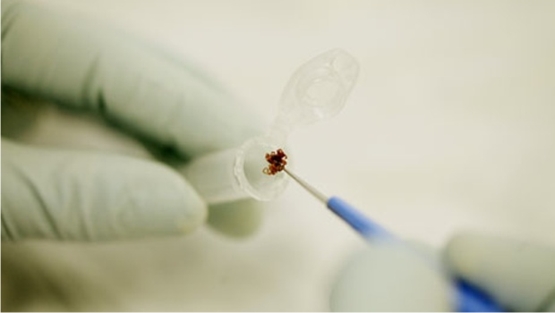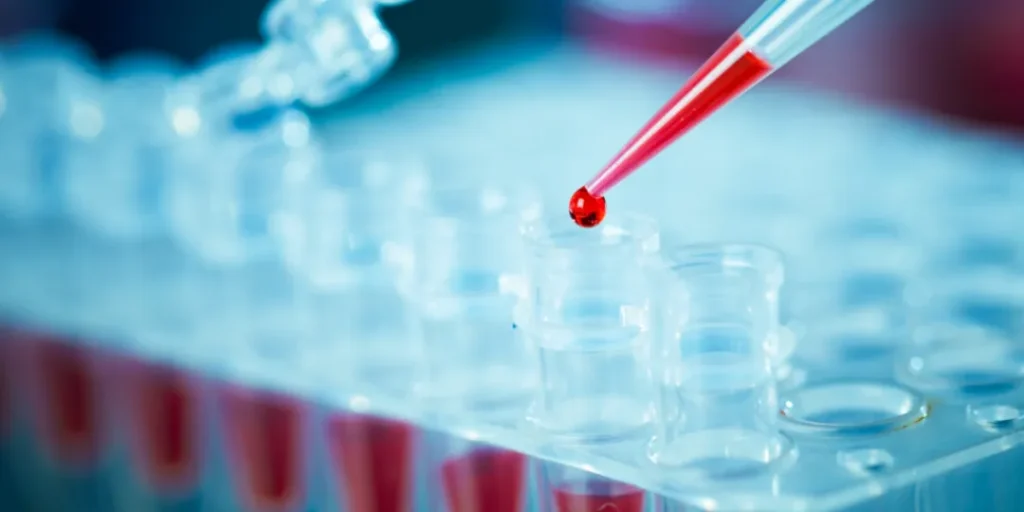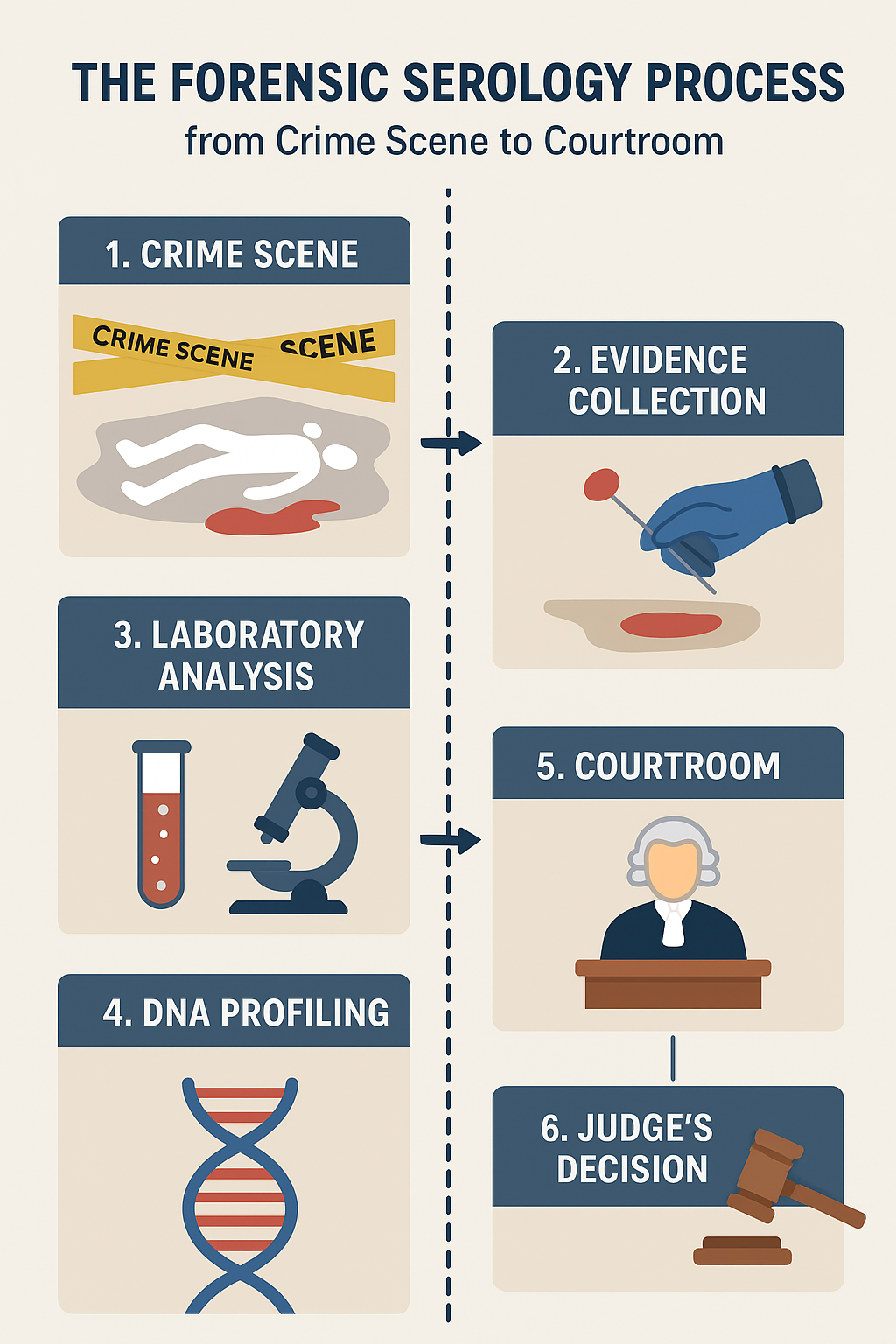-
ceo.bfi@gmail.com
Send Email
-
2C, C-6/A Block, Janakpuri, Delhi India 110058
Visit Our Office
99902-92279
Confidentiality Guaranteed
99902-92279
Confidentiality Guaranteed

Feb
Forensic Serology and Biology

Forensic Serology and Biology
Forensic serology is a crucial branch of forensic science dedicated to identifying, detecting, and analyzing biological fluids such as blood, saliva, semen, sweat, urine, and other bodily materials. These fluids often contain valuable clues that help investigators reconstruct events, identify suspects, and support courtroom testimony.
Before DNA analysis became common, forensic serology was one of the primary tools used to interpret biological evidence. Even today, serology remains indispensable—especially in the early stages of investigations, where determining the type and origin of a bodily fluid can significantly shape the direction of a case.
Forensic serology is the study and identification of bodily fluids in criminal investigations. Serologists examine: Blood, Semen, Saliva, Sweat, Urine, Vaginal secretions, Feces, Vomit, Breast milk and other rare fluids
Their goal is to determine:
What type of fluid is present?
Is it of human origin?
How does it relate to the crime?
Is the sample suitable for DNA testing?
Serology often provides the first scientific answers at a crime scene.
Detection: Identifying the presence of bodily fluids at a crime scene.
Characterization: Determining the type of fluid and its origin.
Preservation: Ensuring the evidence is uncontaminated for further analysis.
Key Techniques in Forensic Serology:
Presumptive and Confirmatory Tests for blood, semen, and saliva.
Microscopic Examination to identify cellular components.
Enzyme and Protein Analysis to determine the biological source.

Forensic biology extends beyond body fluids to include DNA profiling, hair analysis, tissue examination, and microbial studies. It provides a molecular-level identification of individuals and even species, making it highly valuable in both criminal and civil cases.
Key Components of Forensic Biology:
DNA Fingerprinting: Establishing genetic profiles for suspect identification.
Hair and Fiber Analysis: Linking individuals to a location or object.
Touch DNA Analysis: Recovering genetic material from skin cells left on surfaces.
Microbial Forensics: Studying microorganisms that could indicate time since death or contamination sources.
Why Forensic Serology & Biology Are Crucial in Investigations
These sciences help investigators:
✔ Determine the presence and type of bodily fluids
✔ Reconstruct the series of events through bloodstain patterns
✔ Link suspects to victims, objects, or locations
✔ Reveal sexual assault evidence
✔ Identify perpetrators when no witnesses exist
✔ Solve cold cases through preserved biological samples
Together, they convert invisible biological traces into powerful courtroom evidence.
Forensic serology and biology help answer crucial investigative questions such as:
Was a specific person present at the crime scene?
Did the suspect come into contact with the victim?
Can we link multiple crime scenes together?
Examples of Applications:
Homicide Cases: Blood spatter analysis to determine the sequence of events.
Sexual Assault Investigations: Semen and vaginal fluid detection for DNA profiling.
Burglary & Robbery Cases: Saliva from bite marks or cigarette butts linked to the suspect.
Missing Persons Identification: DNA analysis from bone or hair samples.
Real Case Spotlight: Faith Hedgepeth Homicide – Biological Evidence Breakthrough

Date / Location: September 7, 2012 — Chapel Hill, North Carolina, USA.
Victim: Faith Hedgepeth, a 19-year-old undergraduate student at University of North Carolina at Chapel Hill (UNC-Chapel Hill).
Crime: She was found dead in her off-campus apartment, having suffered severe blunt-force trauma to the head.

Investigators found bloodstains splattered on walls, a closet door, and bedding in the apartment; the victim’s body was positioned on the floor, partially undressed, leaning against the bed, with a large pool of blood around her.
Semen and male DNA were recovered at the scene. Investigators confirmed a male DNA profile from the semen and other biological material.
A note was found on a fast-food carry-out bag beside the body, reading: “I’m not stupid (expletive) jealous”. Investigators believed it may have been left by the perpetrator.
Forensic serology played a crucial role: detection of blood, semen, saliva/epithelial cells, preservation of these biological fluids and stains for later DNA profiling. The biological evidence enabled a DNA match when technology advanced.
On September 16, 2021, the Chapel Hill Police Department announced the arrest of Miguel Enrique Salguero‑Olivares in connection with the murder after his DNA matched the profile developed from the preserved evidence.
Why This Case Matters for Forensic Serology
Evidence preservation over time: The biological materials collected in 2012 were crucially preserved so that when advanced DNA methods became available, the match was possible.
Blood and semen analysis: The presence of both bloodstains and seminal fluid gave investigators multiple biological traces to analyze, link to a suspect, and reconstruct the crime scene.
Interdisciplinary forensic work: Serological testing, DNA profiling, and crime-scene reconstruction (bloodstain pattern analysis) combined to turn a cold case into a solved case nearly a decade later.
Legal & investigative importance: The case demonstrates how forensic serology supports law enforcement, criminal investigators, and ultimately the justice system by converting raw biological evidence into actionable leads.
Conclusion
The Faith Hedgepeth homicide is a landmark case demonstrating the enduring power of forensic serology. By accurately detecting, preserving, and analyzing biological evidence — blood, semen, saliva, epithelial cells — serologists provided the crucial scientific foundation that ultimately solved a decade-old murder.
This case proves that even when investigations stall, biology does not lie, and properly handled serological evidence can speak for victims long after the crime occurs.
BFI’s Advanced Approach
At Brilliant Forensic Investigation, we use internationally recognized protocols and state-of-the-art technology to handle sensitive biological evidence:
High-Sensitivity DNA Kits for low-copy number samples.
Automated Extraction Systems for contamination-free processing.
Fluorescent and Chemiluminescent Tests for trace body fluids.
Expert Court Testimony from certified forensic biologists.
We ensure chain-of-custody integrity, maintaining the highest standards so that evidence is admissible and defensible in court.

Biology & DNA Evidence Cross-Examination Question
1. Nature of DNA Opinion
Q. Your DNA conclusion is an expert opinion based on probability, not absolute certainty, correct?
Q. DNA analysis does not identify a person with 100% certainty, does it?
2. Collection & Chain of Custody
Q. You did not personally collect the biological sample from the scene, correct?
Q. Any break or lapse in the chain of custody can affect the reliability of DNA results, correct?
3. Sample Quality & Contamination
Q. DNA samples can be degraded, mixed, or contaminated, correct?
Q. Contamination can occur during collection, storage, transport, or laboratory handling, correct?
4. Methodology & Interpretation
Q. DNA profiling involves statistical interpretation, not direct identification, correct?
Q. Different laboratories or analysts may arrive at different interpretations, especially in mixed samples, correct?
5. Mixed Profiles & Secondary Transfer
Q. A DNA profile may originate from secondary transfer, not direct contact, correct?
Q. In mixed DNA samples, identifying the exact contributor can be complex, correct?
6. Reporting & Limitations
Q. Your report uses terms such as “consistent with” or “cannot be excluded,” correct?
Q. Your DNA opinion must be considered along with other evidence, not in isolation, correct?
Need a Complete DNA Cross-Examination Question?
We provide:
✔ Case-specific biology & DNA cross-examination questions
✔ Indian Evidence Act–aligned legal framing
✔ Criminal and civil matter expertise
✔ Laboratory report and analyst credibility analysis
Contact us to engage professional cross-examination drafting services.
Call To Action

Are you interested in learning more about forensic expert or seeking professional forensic-expert services? Contact us today to inquire about our expertise.
📞 Contact Us: 9990292279
🌐 Visit Our Website: https://forensicexpertinvestigation.com/
✉️ Email: ceo.bfi@gmail.com




